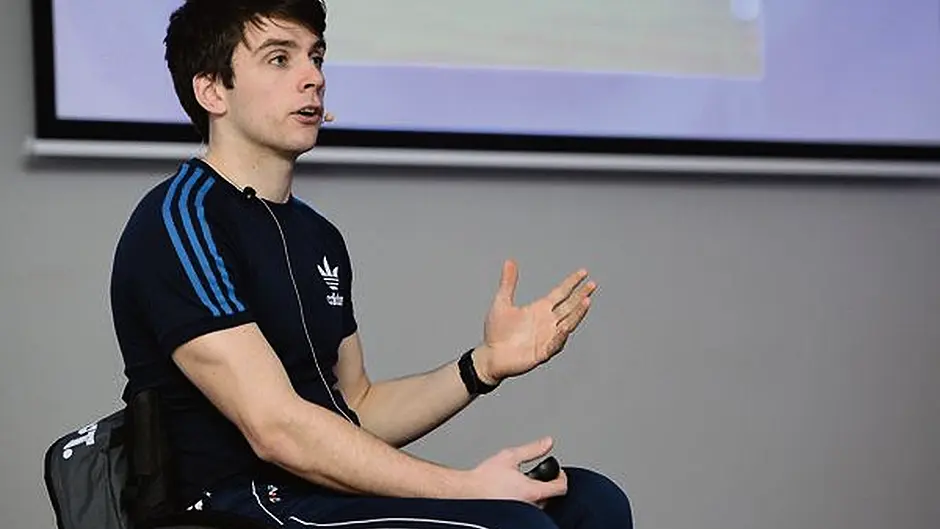Jamie Wall is a shrewd operator, as he showed earlier this year when leading Limerick's Mary Immaculate College to Fitzgibbon Cup glory in his first managerial posting.
BY DENIS HURLEY
JAMIE Wall is a shrewd operator, as he showed earlier this year when leading Limerick’s Mary Immaculate College to Fitzgibbon Cup glory in his first managerial posting.
Of course, if right was right, the 25-year-old Kilbrittain native would still be playing but since 2014 he has been in a wheelchair.
In Wall’s own words, he ‘acknowledges’ his situation rather than ‘accepts’ it, keen to make the most of what he has as well as doing what he can to help find a cure. To that end, he is fully behind the Run In The Dark, which is organised in conjunction with The Mark Pollock Foundation.
Pollock has been in a wheelchair since 2010 but he is leading the quest to find a cure, with Run In The Dark – which takes place in Cork on Wednesday, November 15th – the key vehicle for that.
Wall knows that a ‘fast-track’ cure may take 15 or 20 years, but positivity remains his default setting.
‘You just try to temper it, but by the same token, I’ve tried to take the view that if something good and unexpected comes, to just embrace it, because you’re only going to get two or three days out of it anyway,’ Wall said.
‘You know you’ll go back into that lower rage for three weeks so you might as well make the most of it when you do make a breakthrough.
‘Over the last three years, there have been different things. It can be something small, like when you’re on a full-time catheter in the hospital and managing to get off it – for some people that never happens, so it’s about taking your own small moves towards your own level of happiness.
‘It may or may not be a move towards a cure, but when you eliminate one small problem, of the multitude that you have, just enjoying it.
‘For me, I’m talking about trying to get out of a wheelchair but, for me, one of the best days when I was in hospital was finally getting into a wheelchair, because I had spent the first few weeks in a bed.
‘It’s something I have to remind myself, you want to get out of the wheelchair but it’s also allowed you to do so many things, which 40 or 50 years ago mightn’t have happened.
‘One of the first things somebody said to me in the NRH was that your only reference point can only ever be yourself.’
To that end, the hurling coaching is a key facet of his life.
‘It’s a release,’ he says, ‘but, more than anything, it’s being engaged in something.
‘For some guys, they can go back to their work and their family life and be engaged with that and be happy, and there’s absolutely nothing in the wide earthly world which is remotely wrong with that.
‘Doing the things that drive is what engages you and keeps you happy. For me, sport has always been one of those things so to be engaged in sport again and affecting, that for me is huge.
‘At the same time, I don’t want to be doing something I’m not engaged in. I’m looking around now and there are two things which grab my attention and make me say, “I want to be engaged in that”. One of them is being actively involved in hurling and football, and the other is be actively involved in the physical side of this, being involved in things with Mark.
‘Right now, as a 25-year-old, unmarried with no kids and, for want of a better word, no major responsibilities, my only responsibility is to me and I want to get involved in these things.
‘I want to commit 12 months or two years of my life to a trial like this and when you’re engaged, it’s that bit easier to do these things.’
When Mary I won the Fitzgibbon final against IT Carlow in February, Carlow manager DJ Carey praised Wall as a coach. That he focused on that, rather than framing the achievement in terms of paralysis, meant a lot.
‘It is very important,’ Wall says.
‘I did a coaching conference in Croke Park last January and one of the first things I said was that I was going to deal with it, “I am sitting in front of you in a chair, nobody is stupid, I’m 23 and if right was right I’d be trying my best to make county squads.”
‘I don’t want it to be this elephant in the room – “Oh, you can’t say he’s in a wheelchair,” – because I am.
‘I always try to cut through the bullshit about there being nothing you can’t do, because there are things you can’t do, but I also acknowledge it – now, go on, you’re a coach.
‘If you’re a crap coach, you’re a crap coach, if you’re a good coach, you’re a good coach, being in a wheelchair won’t change that either way.
‘I like that DJ said that but I’ve no idea after 12 months if I’m a good coach or a bad coach, the odds are that it’s somewhere in the middle and you try to get better as time goes on.
‘It is important for me to be defined by what I’m doing rather than the situation I’m in, but by the same token I’ve no problem people talking about it because it is the situation I’m in, once we can move on and say that that’s just a fact and not relevant to the discussion.
‘I did like moving on from that whole narrative of ‘inspiration’, as it’s a word which doesn’t sit too easily with me. I prefer, “He’s a decent coach, he might get better as time goes on – he might not, either, this could be the pinnacle”.
‘I’m not naïve enough to think that it’s not there and people can’t see it, it’s just a fact to acknowledge and then move on from it.’










